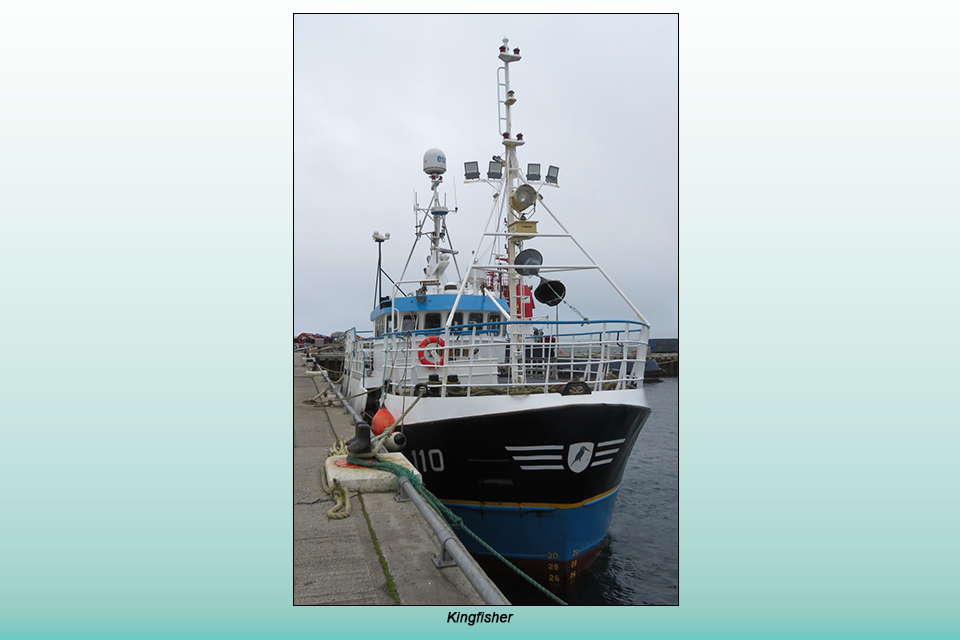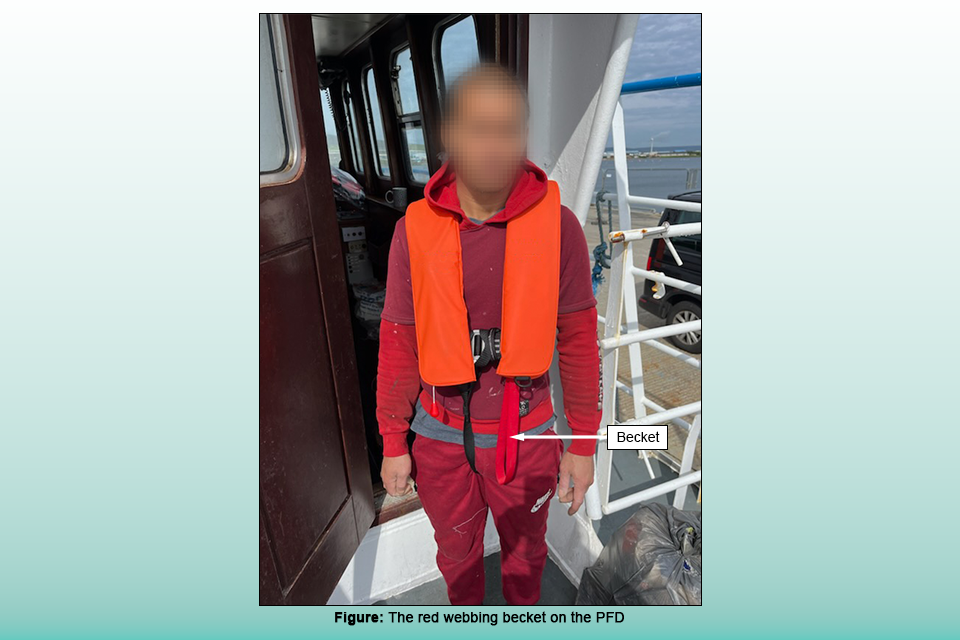Safety flyer to the fishing industry – Kingfisher
Published 11 September 2025
1. Summary
Fatal man overboard from the fishing vessel Kingfisher (DH 110) approximately 30 nautical miles east-north-east of Wick, Scotland on 12 July 2024

2. Narrative
On the evening of 8 July 2024, the potter Kingfisher left Stromness, Scotland with six crew on board. The vessel made passage through the Pentland Firth and on to the fishing grounds to the east of the Orkney Islands. Over the following days the crew recovered and shot strings of creels, mostly during the daytime.
At about 0900 on 12 July, the crew restarted fishing in a water depth of about 50m. By 1500, they began shooting the fourth string of the day. The deckhand was standing at the shooting table manually toggling the creels one at a time onto leg ropes connected to the back rope.
At 1508, the deckhand inadvertently threaded the third creel’s toggle through both the eye in the leg rope and the lifting strop (becket) that was hanging loose from his personal flotation device (PFD). The other crew members on deck heard a scream and saw the deckhand being rapidly dragged by the leg rope across the shooting table and over the side.
The deckhand’s PFD inflated, but he was pulled underwater within seconds by the deployed fishing gear. The skipper manoeuvred the vessel and the crew used the hauler to heave the gear and recover the deckhand back on board by 1515, when they started cardiopulmonary resuscitation.
Paramedics from a rescue helicopter boarded Kingfisher but the deckhand could not be revived; at about 1615, he was declared deceased. His cause of death was later recorded as drowning.
The investigation found that:
-
The becket on the deckhand’s PFD created a snagging hazard that enabled him to inadvertently connect himself to a creel’s leg rope.
-
The becket was initially stowed in the PFD’s stole when new but had worked loose during use (see figure).
-
The hazard of the becket snagging had been identified by other crew members, who had cut the becket off their PFDs, but this had not been communicated to anyone else on board.
-
The vessel’s risk assessment process had not identified the hazard posed by the becket.

3. Safety lessons
-
The risk assessment process is an important part of ensuring that all activities on board your vessel are safe. It should not be an activity that is undertaken once and forgotten. To be effective, risk assessments must address the actual risks, be understood by all on board, and followed.
-
The effect on safety must be considered if changes are made to the working arrangement or equipment on board. It is possible that the existing risk assessment might no longer mitigate the risk and a review or change of equipment is therefore required.
-
Modifying safety equipment in any way changes its designed use and may prevent it functioning correctly when needed. Remove from service and replace any safety equipment that is damaged or inappropriate for the area of operation.
-
In this instance, where a deckhand had to work close to the vessel’s side, a safety tether instead of a PFD could have been considered. See Marine Guidance Note 588 (F) Amendment 21: Compulsory provision and wearing of personal flotation devices on fishing vessels.
4. Further information
Our accident investigation report is available at: https://www.gov.uk/maib-reports/man-overboard-from-fishing-vessel-kingfisher-dh-110-with-the-loss-of-1-life
Extract from The United Kingdom Merchant Shipping (Accident Reporting and Investigation) Regulations 2012 – Regulation 5:
The sole objective of the investigation of an accident under the Merchant Shipping (Accident Reporting and Investigation) Regulations 2012 shall be the prevention of future accidents through the ascertainment of its causes and circumstances. It shall not be the purpose of an such investigation to determine liability nor, except so far as is necessary to achieve its objective, to apportion blame.
Note:
This safety flyer is not written with litigation in mind and, pursuant to Regulation 14(14) of the Merchant Shipping (Accident Reporting and Investigation) Regulations 2012, shall be inadmissible in any judicial proceedings whose purpose, or one of whose purposes is to attribute or apportion liability or blame.
Marine Accident Investigation Branch
First Floor, Spring Place
105 Commercial Road
Southampton
SO15 1GH
Email iso@maib.gov.uk
Enquiries during office hours +44 (0)23 8039 5500

